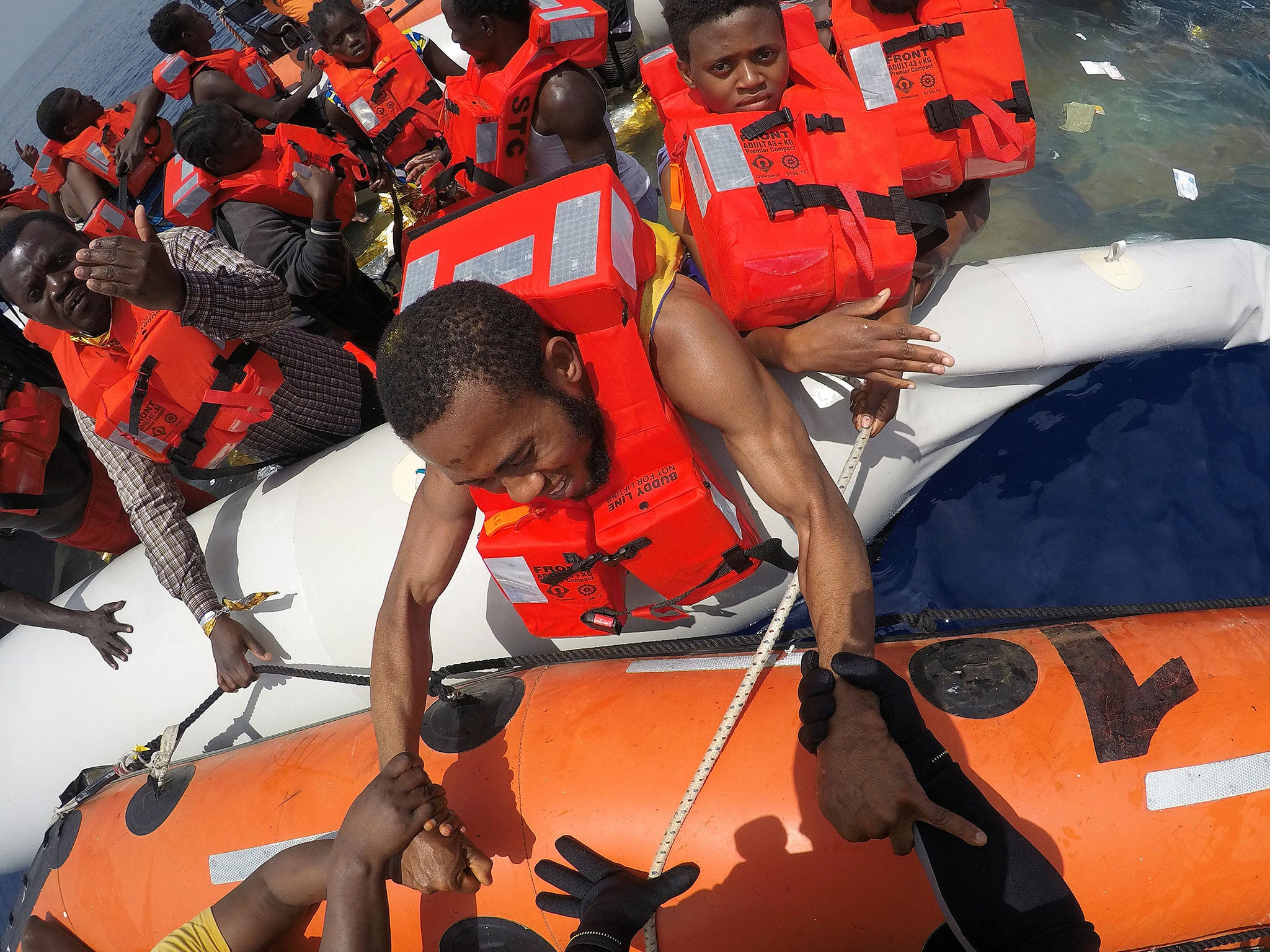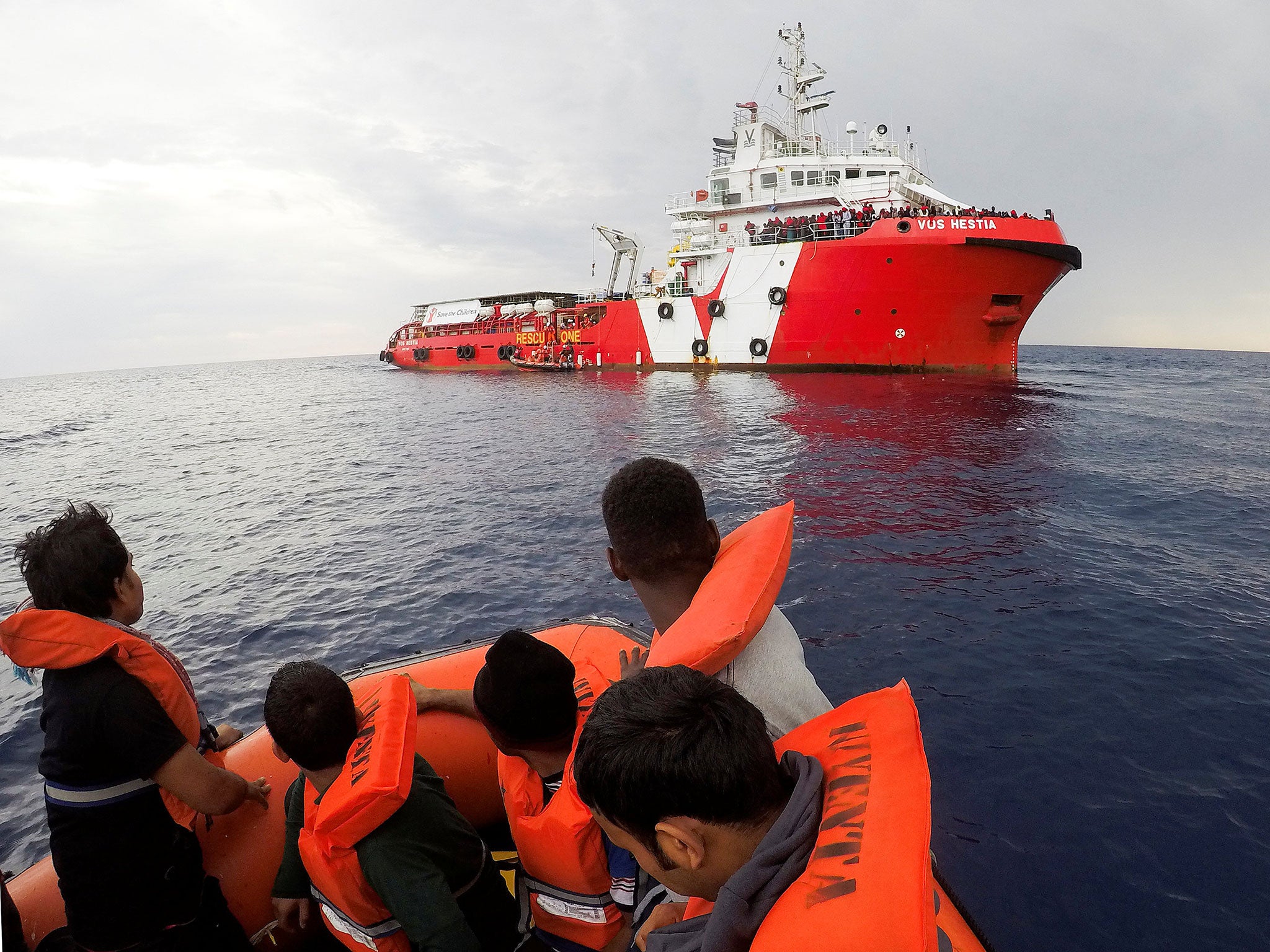Migrant deaths in Mediterranean in 2017 pass 2,000 mark on World Refugee Day after new boat disasters
Humanitarian organisations call on EU to stop ‘demonising’ NGOs for saving lives at sea
Your support helps us to tell the story
From reproductive rights to climate change to Big Tech, The Independent is on the ground when the story is developing. Whether it's investigating the financials of Elon Musk's pro-Trump PAC or producing our latest documentary, 'The A Word', which shines a light on the American women fighting for reproductive rights, we know how important it is to parse out the facts from the messaging.
At such a critical moment in US history, we need reporters on the ground. Your donation allows us to keep sending journalists to speak to both sides of the story.
The Independent is trusted by Americans across the entire political spectrum. And unlike many other quality news outlets, we choose not to lock Americans out of our reporting and analysis with paywalls. We believe quality journalism should be available to everyone, paid for by those who can afford it.
Your support makes all the difference.More than 2,000 migrants have died attempting treacherous boat crossings to Europe so far this year, following three more shipwrecks announced on World Refugee Day.
The United Nations’ Refugee Agency (UNHCR) said 129 asylum seekers were missing and presumed dead after a dinghy launched by smugglers in Libya started taking on water and sank, leaving only four survivors from Sub-Saharan Africa.
Two rescued Sudanese men told the International Organisation for Migration (IOM) the boat had been at sea for several hours when a group of Libyans described as “pirates” approached in a speedboat and stole their motor.
Passing Libyan fishermen rescued the pair along with two Nigerian men who were the only other survivors, and put them on another migrant boat.
“They were in shock, traumatised by what had happened, and exhausted,” said IOM spokesman Flavio Di Giacomo, adding that motor thefts had caused several recent disasters.
Another boat was carrying at least 85 people from Syria and North Africa, including families with children, when it broke in two and sank on Monday.

A third shipwreck is feared to have left at least seven people dead, with survivors including a pregnant woman taken to Sicily.
The UNHCR said the disasters were a reminder of the “grave dangers” facing people forced to flee their countries by war and persecution.
Of almost 83,000 migrants who have arrived by sea in Europe so far in 2017, the vast majority have crossed the central Mediterranean between Libya and Italy – now the deadliest sea passage in the world.
It has claimed more than 2,000 lives since January, according to UNHCR figures, sparking fresh appeals for enhanced rescue operations and the introduction of safe and legal alternatives for a record 65.6 million displaced people around the world.
“More efforts are needed to address the root causes behind these movements of people to Libya, including by solving conflicts and reducing poverty,” said a spokesperson for the agency.
The UN and humanitarian groups have been raising concerns over increased EU support for the fragile Libyan Government of National Accord.
The UK is among countries training its coastguard, while boats, equipment and millions of euros have been handed over in efforts to slow crossings.

But as the Libyan civil war continues to rage six years after the UK supported the removal of Muammar Gaddafi, smugglers have set up a ruthless trade with migrants routinely kidnapped, ransomed, forced into labour, raped, tortured and sold at “slave markets”.
A new report by Human Rights Watch (HRW) said the Libyan coastguard was engaging in “reckless conduct” during operations to force migrant boats back to land – in violation of international laws against refoulement.
It highlighted incidents reported by The Independent in May where the coastguard opened fire while blocking rescues by NGO ships in international waters.
“Recent incidents show how wrong it is for EU countries to entrust the lives of those in need of rescue to Libyan coast guard forces when there are safer alternatives,” said Judith Sunderland, associate Europe and Central Asia director at HRW, calling for Italian authorities who currently coordinate rescues not to hand over command.
The call was repeated by a group of rescue organisations including Sea-Watch, Jugend Rettet and Proactiva Open Arms, who said European plans to “outsource control” of the refugee crisis to Libyan authorities was not practical or legal.
An open letter to mark World Refugee Day on Tuesday called on European naval forces to conduct rescues, stop boats being illegally pushed back to Libya, develop an impartial monitoring system and “support and decriminalise NGOs rather than demonising them”.
Charities and aid agencies operating refugee rescue ships have been accused of aiding and even directly colluding with Libyan smugglers in the increasingly toxic debate, despite research finding no evidence to support the allegations.
Italy, which is housing more than 190,000 asylum seekers in state-funded accommodation, has criticised other European countries for failing to resettle asylum seekers and help rescue efforts.
“I’m sorry that not everyone, including in Europe, has shown the same willingness to take people in [as Italy has],” Prime Minister Paolo Gentiloni said in a message marking World Refugee Day.
“The refugee issue crosses national borders and involves the entire EU and is, in the end, a global phenomenon.”
The Italian navy and coastguard picked up 41 per cent of migrants rescued at sea last year, NGO ships 26 per cent, and ships from the EU-wide Operation Sophia 25 per cent.
But during the first four months of 2017, the proportion of rescues conducted by NGOs has increased to 35 per cent, with Italian authorities carrying out a third and Operation Sophia carrying out just 16 per cent.
EU leaders will meet in Brussels to discuss migration policy on Thursday, after arrivals to Italy jumped by a quarter year-on-year.
Last week, the European Commission opened a legal case against Poland, Hungary and the Czech Republic for refusing to take in asylum seekers under a 2015 plan to relocate migrants from Italy and Greece.

Join our commenting forum
Join thought-provoking conversations, follow other Independent readers and see their replies
Comments